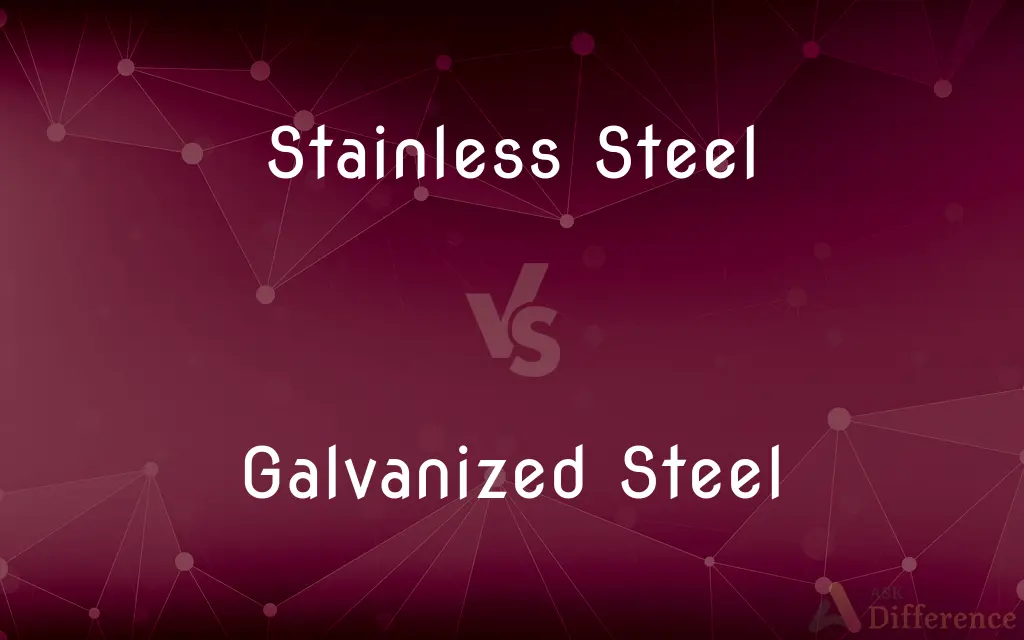Stainless Steel vs. Galvanized Steel — What's the Difference?
By Maham Liaqat & Urooj Arif — Published on March 4, 2024
Stainless steel is an alloy known for its corrosion resistance due to chromium content. Galvanized steel is carbon steel coated with zinc for corrosion protection. Stainless is durable and expensive. Galvanized is cheaper but requires more maintenance.

Difference Between Stainless Steel and Galvanized Steel
Table of Contents
ADVERTISEMENT
Key Differences
Stainless steel, containing chromium, offers inherent corrosion resistance, making it ideal for environments prone to rust. Galvanized steel, however, relies on a zinc coating that acts as a protective barrier against oxidation but can wear over time. This fundamental difference in corrosion resistance affects their durability and areas of application, with stainless steel often preferred for its longevity and minimal maintenance.
Stainless steel boasts a sleek, modern appearance maintaining its look over time, galvanized steel has a distinctive, rugged finish due to its zinc coating. This visual aspect influences the choice between the two for architectural or aesthetic purposes, with stainless steel typically favored for its cleaner, more consistent appearance.
In terms of cost, stainless steel is generally more expensive upfront due to its composition and manufacturing process. Galvanized steel, on the other hand, is a more cost-effective solution initially, though potential long-term maintenance and replacement costs can mitigate these initial savings, especially in corrosive environments.
The environmental impact of both materials also varies. Stainless steel, with its high recyclability and longer life span, often has a lower overall environmental footprint. Galvanized steel, while also recyclable, may require more frequent replacements and can release zinc into the environment as the coating degrades.
When it comes to strength and weight, both materials offer high strength, but the specific alloy composition of stainless steel can provide superior strength-to-weight ratios. This makes stainless steel preferable for applications where strength is crucial but minimizing weight is also a factor.
ADVERTISEMENT
Comparison Chart
Composition
Alloy with at least 10.5% chromium
Carbon steel with a zinc coating
Corrosion Resistance
High due to chromium content
Moderate, depends on zinc coating integrity
Cost
Higher initial cost
Lower initial cost, but may incur maintenance costs
Appearance
Sleek, modern, maintains appearance
Rugged, can deteriorate over time
Environmental Impact
Lower impact, highly recyclable
Moderate impact, recyclable but zinc can be harmful
Compare with Definitions
Stainless Steel
Favored in architecture for its aesthetic appeal.
The stainless steel facade gives the building a modern look.
Galvanized Steel
Cheaper alternative for fencing materials.
Galvanized steel is preferred for chain-link fences due to cost efficiency.
Stainless Steel
Ideal for food processing equipment.
Stainless steel vats are used in breweries for their cleanliness.
Galvanized Steel
Requires inspection for zinc coating integrity.
Regular checks are needed to ensure the galvanized steel's coating hasn't worn off.
Stainless Steel
A corrosion-resistant alloy containing chromium.
The kitchen sink is made of stainless steel to resist rust.
Galvanized Steel
Steel coated in zinc to prevent rust.
The galvanized steel roof withstands heavy rain without rusting.
Stainless Steel
Used in medical instruments for its non-reactivity.
Stainless steel scalpels ensure sterility in surgeries.
Galvanized Steel
Often used in outdoor constructions.
Galvanized steel frames are common in outdoor benches.
Stainless Steel
Common in automotive parts for durability.
Stainless steel exhausts resist corrosion from harsh weather.
Galvanized Steel
Can be welded with precautions against zinc fumes.
When welding galvanized steel, proper ventilation is essential to avoid inhaling toxic fumes.
Stainless Steel
Alternative spelling of stainless steel
Common Curiosities
Which is more expensive, stainless steel or galvanized steel?
Stainless steel is generally more expensive due to its composition and benefits like corrosion resistance and aesthetics.
How long does the zinc coating on galvanized steel last?
The lifespan of zinc coating varies with environmental conditions but generally offers protection for several decades.
Can stainless steel and galvanized steel be used together?
It's not recommended to use them in direct contact in corrosive environments, as galvanic corrosion can occur.
How do the environmental impacts of stainless steel and galvanized steel compare?
Stainless steel typically has a lower environmental impact over its lifecycle, thanks to its durability and recyclability, compared to galvanized steel.
Can galvanized steel be used in marine environments?
Galvanized steel can be used in marine environments but may not perform as well as stainless steel due to the harsh conditions.
Is stainless steel 100% rust-proof?
While highly resistant to corrosion, stainless steel can still rust under certain conditions, especially if not properly maintained.
Can the zinc coating on galvanized steel be repaired?
Yes, areas of damaged coating can be repaired with zinc-rich paints or by re-galvanizing.
What is the main difference between stainless steel and galvanized steel?
The main difference is their corrosion resistance; stainless steel contains chromium for inherent resistance, while galvanized steel has a protective zinc coating.
Is stainless steel magnetic?
Some stainless steels are magnetic, depending on their composition, particularly those with higher iron content.
Why is stainless steel preferred in food processing?
Its non-reactivity and ease of cleaning make it ideal for maintaining food safety standards.
Can galvanized steel be painted?
Yes, but it requires proper surface preparation to ensure adhesion.
What maintenance does galvanized steel require?
It may need periodic inspection and maintenance to repair any damaged zinc coating.
Are there different grades of stainless steel?
Yes, there are multiple grades, each suited to different environments and applications.
Which is better for outdoor furniture, stainless steel or galvanized steel?
Stainless steel is often preferred for its durability and maintenance-free longevity, although galvanized steel is a cost-effective option if properly maintained.
Does galvanized steel affect the taste of water?
Generally, it does not, but poor-quality coatings can sometimes impart a metallic taste.
Share Your Discovery

Previous Comparison
Petrolatum vs. Petroleum Jelly
Next Comparison
Sanitarium vs. SanitoriumAuthor Spotlight
Written by
Maham LiaqatCo-written by
Urooj ArifUrooj is a skilled content writer at Ask Difference, known for her exceptional ability to simplify complex topics into engaging and informative content. With a passion for research and a flair for clear, concise writing, she consistently delivers articles that resonate with our diverse audience.











































